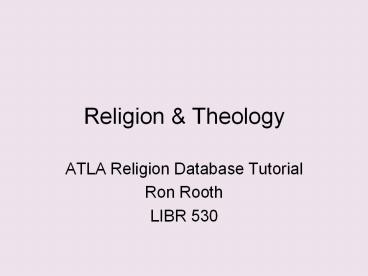Religion - PowerPoint PPT Presentation
1 / 27
Title: Religion
1
Religion Theology
- ATLA Religion Database Tutorial
- Ron Rooth
- LIBR 530
2
ATLA American Theological Library Association
Religion Database
- The ATLA Religion Database together with ATLA
Serials has around 1.5 million records from
journals, reviews, essays, books, multi-authored
works. Many full-text. - The journal collection represents all major
faiths and denominations. - English representation is 60
- Indexes individual essays in multi-authored
works.
From http//www.atla.com/products/catalogs/catalog
s_rdb.html
3
ATLA Religion Database Scope notes from UBC
Library description http//toby.library.ubc.ca/res
ources/infopage.cfm?id532
- Covers Biblical studies, world religions, church
history, and religious perspectives on social
issues. - Coverage dates from 1949 although some journal
indexing extends as far back as the nineteenth
century.
4
Lets say we want to know what articles there are
on a particular part of the Bible.
5
Wonder what scholars are saying about the book of
Job these days?
Just type Job in the Browse For box and hit
browse
6
Our purposes are too general for this kind of
search. It works much better if we have specific
chapters, or even specific chapters and verses in
mind.
Watch out, this list is ordinal. After chapters
1-3, comes chapter 10. Another reason we need to
be more specific.
7
So lets say we had more specific purposes, and
wanted to know what scholars are citing Job,
chapter 16.
Looks like well still have to click a few boxes
if we just want everything on that chapter.
8
Now were ready to get those articles
9
This is our results page. It looks like our
Scripture Browse functions as a query builder.
Note the 10 results
10
We could have gotten the same results just by
doing a keyword search with this syntax. SC is
a tag that stands for Scripture Citation. 16
was the chapter of Job we were interested in.
Lets go back to the Scripture Browse for a
minute.
11
The Scripture Browse works great if
12
you want to combine several specific Biblical
citations
13
into a query
14
where all citations are for sure indexed, and
where you dont have to type the lengthy query
yourself.
15
Summing up the Scripture Browse function in ATLA
- Good for quickly finding specific citations. For
example Job 1613 good, Job not so good. - Dont forget, the results list is ordinal ie.,
its not in chapter order. - Good for combining many inter-Biblical citations
quickly into a query. - Results are guaranteed ie. all citations listed
in the Scripture Browse refer to retrievable
articles in the database.
16
ATLA Religion Database Tutorial
- Controlled Vocabulary Index better than
Scripture Browse
17
Lets go into the controlled vocabulary index
18
Choose Scripture Reference from the drop-down
menuand type job in the Browse for box (not
shown).
19
Its the same ordinal list as in the Scripture
Browse, but at least we can now grab everything
Job. Plus, we get a record count.
Click on Add to start building the query
20
I typed leviticus in the browse box, checked
off the everything leviticus box, selected
and from the Boolean drop-down menu. Now well
add that to our Job.
21
Z in the tag means a search of one of the
controlled indexes. In this case, the P in the
tag means scripture reference. You could put
these in yourself in a key word search.
So Leviticus has been added to Job. Now lets get
those papers that refer to Biblical citations
from both Job and Leviticus.
22
Very nice. Excellent results
Lets go back and build a search using two
different sets of controlled vocabularies.
Note this controlled term
23
Lets browse Subjects All for the term
visions that we nabbed from our previous
results.
24
Check the box visions. And lets grab visions
in the Bible while were at it. Now click Add.
Dont forget to change the Boolean drop-down to
OR.
25
Next, we chose the Subjects All index, browsed
for Job, clicked the Job box, selected the
AND operator, and added to the query. Now hit
Search.
26
Some pretty nice results there.
27
Summing up the Index Browse function in ATLA
- A more thorough way to search for articles which
reference specific Biblical citations. - Still sorts by ordinal numbers.
- Allows you to combine citation searches with
controlled subject-headings using Boolean
operators. - You dont have to memorize all of the tags.
- Excellent relevance compared to keyword searching
without tags.































